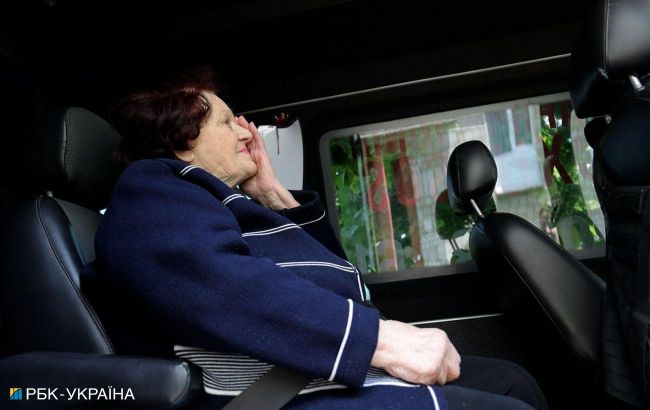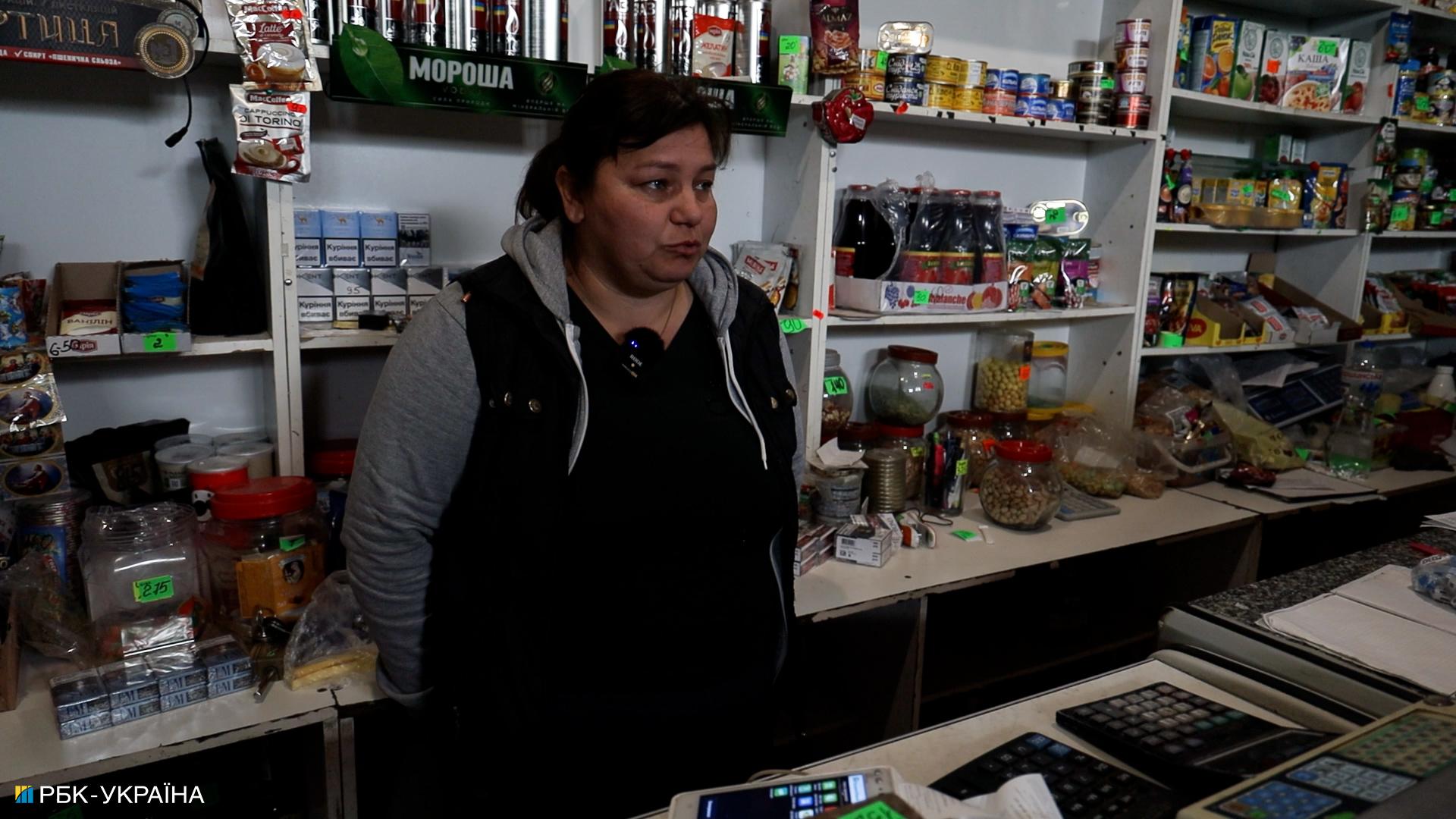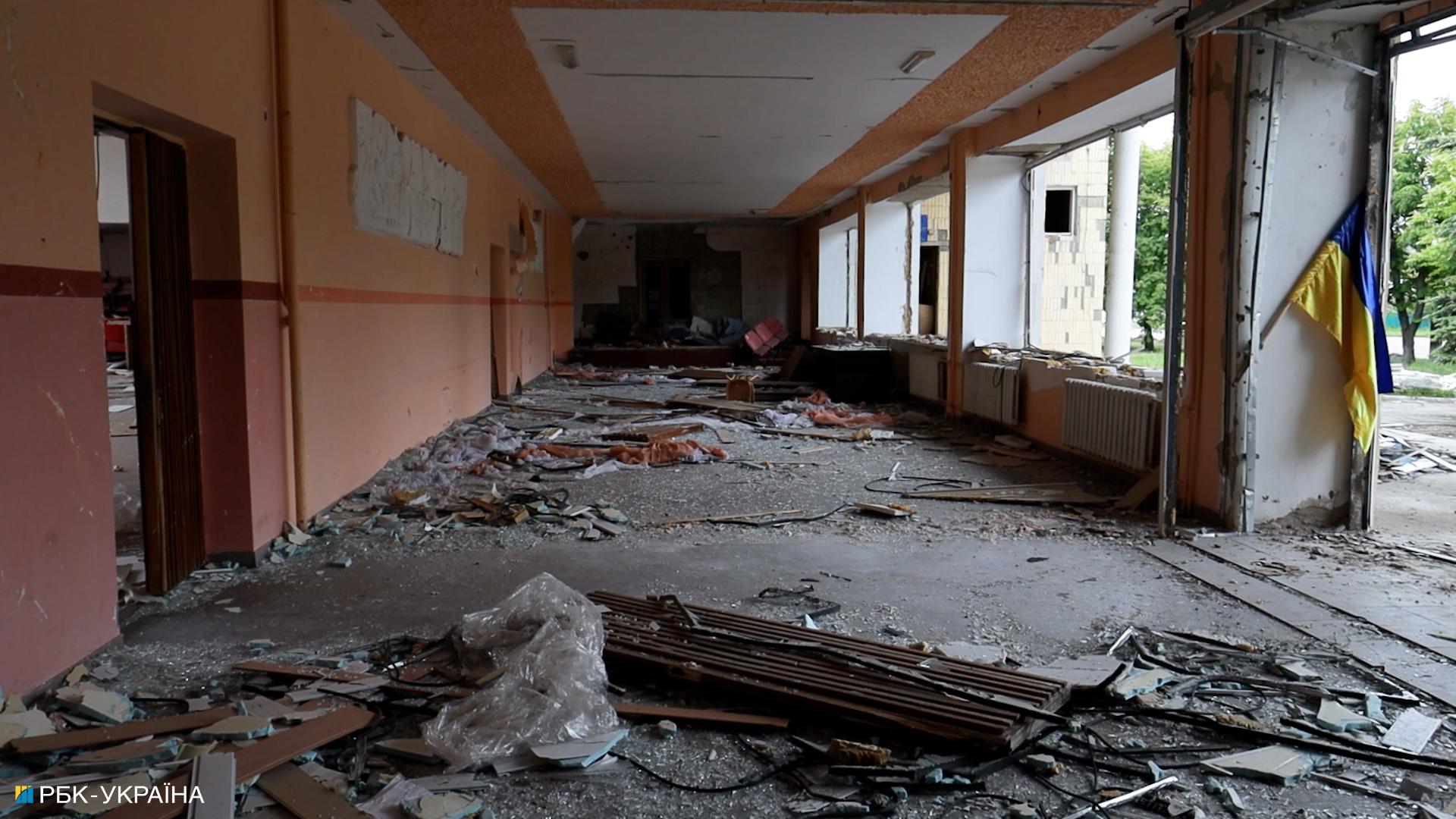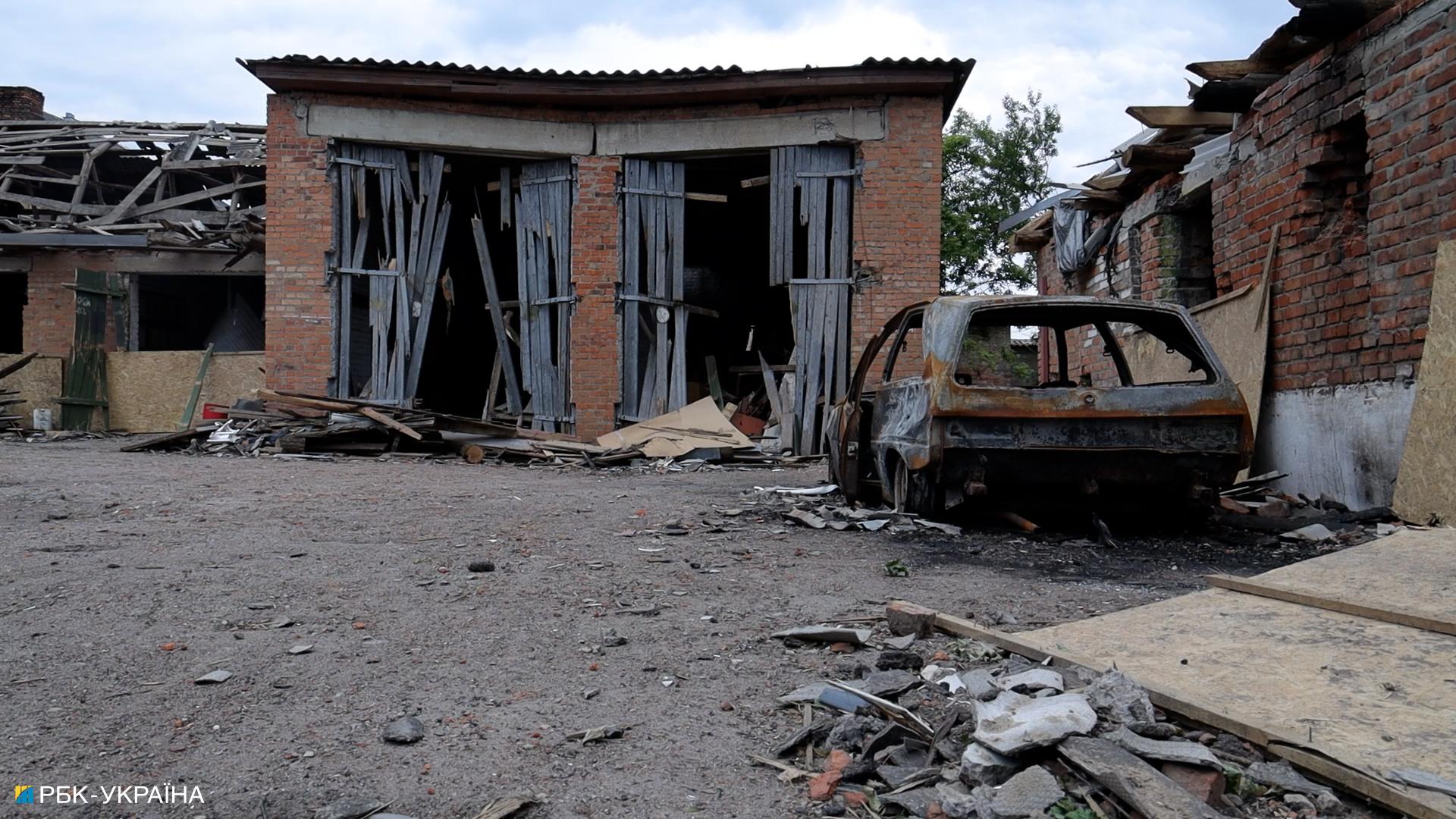'We won't kneel before Putin': Life in Sumy under constant Russian shelling
 A resident of Sumy region being evacuated (photo: RBC-Ukraine)
A resident of Sumy region being evacuated (photo: RBC-Ukraine)
The border area of the Sumy region is under constant Russian shelling. Russia uses it as a testing ground for new weapons. RBC-Ukraine's report shows how Ukrainians live a few kilometers from Russia.
After the start of the Russian offensive in the Kharkiv region, there were fears that the Russians might try to break through in the neighboring Sumy region. So far, this has not happened, but the Ukrainian border regions are being shelled continuously by Russia. Nevertheless, thousands of local Ukrainians still do not want to leave their homes.
Velyka Pysarivka
The endless fields that used to provide bread for the entire Sumy region and beyond are now dotted with Russian mines. The Russian occupiers have left their marks here, depriving farmers of their livelihood for at least several years. Some farmers try to grow grain at their own risk, but sometimes the price is too high.
We are driving along the fields, and in the distance, we can already see the stele Velyka Pysarivka. This is a small town that borders the Belgorod region. The Russian attack on the Sumy region was launched from this town at the beginning of the full-scale invasion of Ukraine. The residents stayed under Russian occupation for over 40 days until the Ukrainian Defense Forces drove the Russian troops out. But the Russian military, even after physically leaving the region, continues to remind of its existence with daily shelling.
_3_1.jpg) Photo: RBC-Ukraine
Photo: RBC-Ukraine
Every other building in Velyka Pysarivka has been destroyed. Those houses that have survived have walls and boarded-up windows. In peacetime, a little over 4,500 people lived here - today, there are barely five hundred, as the locals are regularly evacuated. Those who stayed have learned the danger by the sounds: a slight rustle means a guided aerial bomb is about to strike, a whistle means a rocket, and a whistle from everywhere means MLRS. That's why people only go out when they need to and move quickly.
We are approaching the House of Culture. It would be almost no different from thousands of similar cultural buildings all over Ukraine: benches made of red chairs upholstered in leather, velvet curtains, and herringbone parquet. But there is a difference - the Russians dropped a bomb on the House of Culture in Pysarivka. Glass crunches underfoot, and somehow outerwear is still hanging in the wardrobe. We enter the assembly hall, and a cat slowly descends from the stage to us. One of the recent shelling had torn off his ear. The man accompanying us nods at the cat: "He lost his ear, but he didn't lose his hatred for Russians."
Pysarivka has a grocery store for five hundred people. The women who work there say it's scary to live here, but they have to feed the locals. "We don't have a shelter, we don't hide anywhere, we stay in the store," one of the saleswomen shrugs, and at home too, she adds.
When the city was under intense Russian shelling, the Ukrainian military brought the women bulletproof vests and stayed with them. Now they are waiting to visit them again - alive.
The rockets and guided aerial bombs ended the lives of the houses so quickly that many of them froze as if they still could not believe what had happened. On the remnants of the walls hang calendars that did not have time to turn to the right date, shelves with torn-off doors and plastic dish dryers, and kitchen clocks with fruit on the dial. It was as if we were looking into someone else's life, which suddenly opened up to us because a piece of the wall was torn off. It has stopped, but it seems that if you go in, sit down at the sooty table, and life will spin around you again.
 Photo: RBC-Ukraine
Photo: RBC-Ukraine
We move on to the educational quarter. The Russians have been killing Ukrainian children since the beginning of the full-scale invasion, cynically inventing excuses for this. When the Russian invaders destroyed a theater in Mariupol with a bomb where huge letters at the entrance that read CHILDREN, they claimed that Azov fighters were in the building. It is unclear what arguments Russians come up with when they deliberately target an ordinary school. The evidence of Russian crimes is right there in the palm of our hands, a shameful confirmation of the genocide of Ukrainian children.
Velyko-Pysarivskyi Secondary Education Institution - this sign hangs on a smashed multi-story building. Next to it, a children's bus with teeth of glass instead of windows has been shot. A few meters away is the building of a kindergarten, which shows signs of fire. No children are heard here anymore, although these neighborhoods used to be buzzing with their voices. 11th-graders should be celebrating their graduation and launching balloons into the sky, but the doors of this school are closed until the war is over.
Among the five hundred locals, several dozen are police officers. They do not control the order on the streets because the streets are empty. Instead, people's lives sometimes directly depend on them. Law enforcement officers provide the locals with necessary things in case of escalation, go to help during Russian shelling and evacuate the population. But the hardest part is to make people aware of its importance.
 Photo: RBC-Ukraine
Photo: RBC-Ukraine
"We are constantly conducting events to explain why it is necessary to leave. But since there is no forced evacuation, we cannot force people to leave," says a local police officer.
Most of those who stayed in Velyka Pysarivka are elderly. They say they are not welcome anywhere, and this is their home. The police officer who tells us about this adds that the hardest time was when the Russian Volunteer Corps entered the Belgorod region. Everyone understood the purpose of the Russian volunteers and, of course, supported them, but the shelling did not stop for an hour. However, it is difficult to distinguish any calm period after the Russian invasion at all - with Russia around, a ceasefire may mean a pause before even more intense shelling.
In the middle of the destroyed street, a small old house stands out, with an old woman sitting on a bench next to it, and three dogs sleeping peacefully next to her. She stayed here because she didn't want to leave the place where she was born and spent her whole life. She and these dogs are the only ones left on the street, and the old lady feeds them with what she has.
While we are talking to her, her voice gradually takes shape and becomes more sonorous, and at some point, the old woman breaks down in tears: "Why are they (Russians - ed.) doing this? Why are they destroying the Ukrainian people? What have we done to them?!"
After calming down a bit, the old woman recalls Velyka Pysarivka before the Russian invasion beautiful, quiet town with trees that look like they were painted with a brush. The Russians also liked to come here - it was better than theirs. They probably also destroyed it with this thought in mind, because it was better.
"The Ukrainian people will not kneel before Putin, so don't expect it. We will not be slaves. Let him hide in a bunker, but the Ukrainian people are hardworking, there are no serfs here. I'm not afraid of Russian shelling!" the woman says.
_1.jpg) Photo: RBC-Ukraine
Photo: RBC-Ukraine
Bilopillia
The road to this town surprises with its architecture. Local churches have nothing in common with Russian ones. They are built of red brick, with glass mosaic roses and spires that grow into the sky. The Sumy region makes it clear that it is not part of the Russian Empire and has never been.
Bilopillia is not much different from Velyka Pysarivka, which is also covered with the footprints of the Russian occupiers. We are approaching one of the high-rise buildings-the house with several entrances is intact, but only a few people live in it. On this day, one of the residents has to be evacuated, but the other has to stay because she has a son with a disability. She is expecting us to visit.
The first thing that catches the eye is the mattress in the hallway. This is where the woman and her son wait out the Russian attacks. They take turns resting because there is not enough space - someone lies down, and someone stands. Sometimes they stay like this for hours, until the Russian shelling stops.
We are greeted with classic Ukrainian hospitality - fried potatoes are ripening on the stove, the aroma of which we smell on the stairs. A woman is carefully cutting up the delicacies she has been saving for a special occasion, as she is eager to serve them to her guests.
_1.jpg) Photo: RBC-Ukraine
Photo: RBC-Ukraine
She says she can't go because her son is a war veteran and has a second group of disability. At first, she did not want to leave, but then, when there was almost no way out, a shell hit the building where their documents were kept, and everything burned down. Her biggest fear is going to the store or pharmacy because she has to do it under fire. She is very afraid of dying because then her son will be left alone. Besides him, the only thing that keeps her warm is the light in the windows of neighboring houses, which sometimes appears in the evening.
"There are only three of us in the whole building, three pensioners. And one is my friend who is in a wheelchair. She will be leaving today," the woman says.
From outside the window, we hear a car horn - an evacuation vehicle has arrived. The woman quickly gets ready to say goodbye to her friend. While the car is being taken out of the car ramp, the neighbors look out of the windows - there are only a few of them in the whole house. The woman raises her head and waves to those who are left, and they wave back: "Come back, let's drink to the victory!" When they take her to the car, she manages to quickly wipe her eyes with her sleeve.
_1_1.jpg) Photo: RBC-Ukraine
Photo: RBC-Ukraine
There are still many elderly people in Bilopillia who are unable to leave, but volunteers are taking care of them. Without bulletproof vests and helmets, they ride their bicycles along the border every day under Russian fire. There are still workers in the city's territorial service center who could not leave their clients behind. They say that you need to be born into this profession. Every day they deliver provisions and food to the elderly and take care of the land. "War is war, but the garden has to be dug and planted," adds the territorial center worker sternly.
The mayor of Bilopillia has also stayed in Bilopillia and is happy to talk to journalists. We meet in the middle of the city ruins. Almost the entire center has been destroyed and is beyond repair, says the mayor. The Russians are bombarding the town's neighborhoods with everything in their arsenal, from Shaheds to bombs. When the number of guided aerial bombs increased to ten a day, the townspeople realized that this was just a prelude. "They train their artillerymen on the civilian population of Ukrainian cities. We are like a training ground for them," says the mayor.
Myropillia
The road to Myropillia is littered with small pieces of iron that look like darts. Russians fill ammunition with such shrapnel to inflict more damage on residents when it explodes. These so-called darts are very dangerous because they are difficult to remove from the body.
The head of the village says that the situation in Myropillia is critical: before Russia's full-scale invasion of Ukraine, just over four thousand people lived here, and now only half of them are left. People spend most of the day under fire and are very tired. The locals say they want peace, but most of all they want victory: "Everyone is very tired. It's hard, you go to work and you don't know if you'll get there, the time from launching to striking is very short."
 Photo: RBC-Ukraine
Photo: RBC-Ukraine
The school here is the same destroyed and the same remains of houses around. Residents, as soon as the Russian shelling subsides, get to the center and quickly clean up what they can. That's why in some places you can come across a colorful spot of flowers that people have planted. And next to it, there is a trace of another "flower" - a shell from a Russian fire system Pion (Peony - ed.). People planted flowers near this crater on purpose - despite Russians.
With the Russians at their side, the residents of Myropillia decided to leave them a message. One of the locals shows it to us, barely holding back his laughter. Here, almost near the border, they collected a lot of things for the Russian occupiers - washing machines, old plumbing, basins, and even women's underwear. "This is our hospitality for them now," the man says, winking at us, "let them take the toilets and leave us. Follow the Russian warship."

